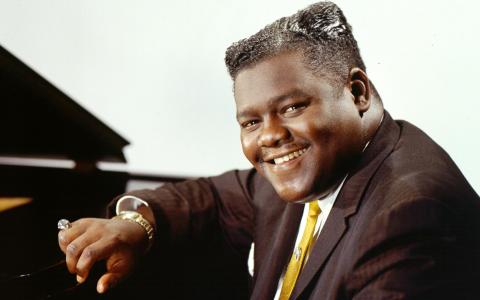
Sometimes only the young die rich. Staying on top of Blueberry Hill as long as you can is the key to keeping your net worth from falling behind your legend.
Fats Domino died a legend, a star so firmly set in the rock-and-roll sky that he’s been in the industry hall of fame a full three decades.
But that huge cultural impact didn’t translate into a vast fortune by today’s rock-star standards. Scattered reports estimate that he might’ve died with $8 million in personal wealth, largely a factor of a substantial but shallow songwriting catalog.
And there are hints that he had trouble staying liquid late in life. Hurricane Katrina destroyed his New Orleans residence and he never really moved back — reading between the lines, I’m not sure the house was fully restored.
It took an industry fund-raising album just to fix up his home office. In the meantime, he effectively retired, so whatever he accumulated in his working life has probably eroded like most retirees’ nest eggs, no matter how frugal the lifestyle.
Either way, compare that lifetime score to similar estimates that Taylor Swift has earned $280 million in barely one decade to Domino’s six.
Stick to the constants
On the surface, Swift benefits from the new economics of today’s mega-star contracts. We simply live in a higher-rolling world now where the brightest lights of many industries — from Hollywood to Wall Street — can earn what would once have taken a lifetime in a single year.
Needless to say, she’s also got huge sponsorship and licensing opportunities that just weren’t available to Fats Domino early in the 1950s when it took a Perry Como or Ricky Nelson to get his songs on TV.
But the generational comparison isn’t all one-way. Overall sales and royalties in the record business have collapsed, so today’s pop icons need to tap every alternative cash opportunity they can if they want to live like stars.
Touring is still where the big money is. Domino didn’t do badly on that front. At his peak, he grossed the equivalent of $4.5 million a year in today’s dollars playing the live circuit.
Expectations were different then, too. Domino lived like a king when the hits were rolling and if he ended up with roughly $0.10 to $0.15 per record sold, he did all right in the decades that followed.
Retirement by another name
The problem is that we’re looking at a lot of decades, during which time Domino’s style and fan base aged out of the entertainment mainstream.
We’ll see how well Taylor Swift does if she goes 57 years without a Top 10 hit. Whoever you are, that’s too long to simply coast on past glory.
If you’re going to scale back and turn the career that made you famous into a hobby, you’re effectively tiptoeing toward retirement.
That’s great. Your net worth is unlikely to increase dramatically because the earning power that made you special stops firing on all cylinders, but it’s a natural decision most people make sooner or later.
Domino stopped touring two decades ago because he got tired of the food in the markets willing to pay top dollar for a nostalgia act. He was 67 years old. It was time to slow down.
He hasn’t released a new studio album since the early 1980s. He hasn’t needed the cash and arguably would’ve needed to take big creative risks to evolve his style for the new generation of record buyers.
Not everyone is a big risk taker as they age. Some people create masterpieces in old age. Others keep working any gig they can get because they have to pay the bills somehow.
Domino arguably wasn’t driven to create a true masterpiece since the Eisenhower era. But with just enough of the publishing rights, he could afford to step aside.
He was insanely productive early on. There’s easily 1,100 tracks with his name on them earning royalties to this day.
Every time anyone plays that Ricky Nelson or Perry Como cover, his estate gets its piece. When those pieces add up right, you don’t need to sing your own songs any more.
Sometimes those passive revenue streams dry up. The cover versions stop selling and nobody licenses the material any more. It happens.
That’s when creative people think about cashing out if they can — the record labels are usually happy to buy song catalogs — or trading on pure nostalgia while it’s there.
The cash can fund new investment. I’m rarely a fan of hypotheticals, but if Domino had taken $0.10 out of every copy of “Walkin’ To New Orleans” back in 1960 and park it in a brand-new index called the S&P 500, he would’ve had an extra $5 million to spend when he hit retirement age.
With a little more ambition, he could’ve built music studios, expanded the publishing catalog, accelerated and strengthened those passive income streams.
Maybe that would have been a rewarding life for his kids to inherit. As it is, he’s left them with some cash and a trickle of royalties to go with the legend.
You’ve probably got clients in a similar wealth bracket. This isn’t a bad outcome for them, and it probably wasn’t one here.
Not everybody dies a billionaire. Not everybody helps seed a cultural revolution either.



